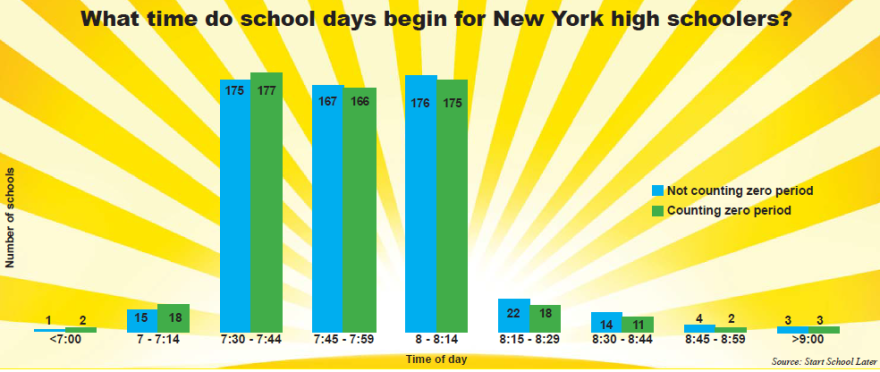If you have teenagers, you know it can be difficult to get them out of bed and off to school in the morning. Now, there's a growing movement to move high school start times to later in the morning.
The New York State School Boards Association says nearly six in 10 school board members recently polled think the high school instructional day in their districts should begin later to accommodate teenagers’ natural sleep cycles. NYSSBA's David Albert acknowledges there would be logistical challenges in doing so. "Typically we see high school students going to bed maybe around 11. They're getting up and getting to school by 7:30 or 7:45, which is often the case. They're not getting the requisite number of hours of sleep, and so that can affect their academic performance."
The Centers for Disease Control and Prevention says most American adolescents start school too early. Its 2014 School Health Policies and Practices Study found 93 percent of high schools and 83 percent of middle schools in the U.S. started before 8:30 a.m.
The idea of starting high school later is already being practiced in some school districts across New York. According to data from a group called Start School Later, 42 high schools around the state start their instructional day at 8:15 a.m. or later; 20 start the instructional day at 8:30 a.m. or later. ~ NYSSBA
Experts say there's a lot of resistance when it comes to re-setting the schoolday clock. Stacy Simera is a mental health counselor who volunteers for the national non-profit "Start School Later." "Human beings naturally are uncomfortable with change. And a lot of parents and school administrators, erroneously assume that this is a big change. And it actually isn't. If you look about 30 years ago, a lot of school started after eight, sometimes even after nine. It wasn't until we started spreading schools out, making longer bus runs, separating out elementary, middle and high school, that we started inching middle and high schools earlier. And bless our hearts. We didn't know any better. We weren't aware of the research when we first started setting it up so the kids were catching the bus at 6 in the morning. But since we've gotten these schedules established, you have some schools and communities afraid that it's a big change, to refer back to healthier start times."
Simera adds those later school start times fit teenage biology. She notes a temporary phenomenon associated with puberty where teens secrete the sleep hormone later in the evening and continue to secrete it later in the morning. "A lot of your listeners are gonna say, ugh, we gotta prepare kids for the real world, you know, we can't go an coddle them and let them sleep in. But the thing is is, we need to let them get through puberty as healthy as possible before they go into the real world."
Attempting to sound out resetting the clock for Columbia High students, East Greenbush Central School District hosted three community forums in November to discuss the impact changes would have.
Superintendent of Schools Jeffrey Simons: "Based on the feedback that we received at community forums in November, we determined to recommend to the board of education that we take another year to study some options for changes. We've heard from the community that the proposal that we thought was the most feasible at this time, which involved having a much earlier elementary school start time, posed some significant concerns for our parents at the elementary school level regarding daycare, as well as the impact of that earlier start time. Right now our elementary school start at nine and conclude at 3:30. Our proposal involved having a 7:30 in the morning start time for elementary schools and a dismissal around two in the afternoon."
Simons says the largely rural district also has to factor in deployment of its bus fleet, as a limited number of vehicles are used to transport students.






